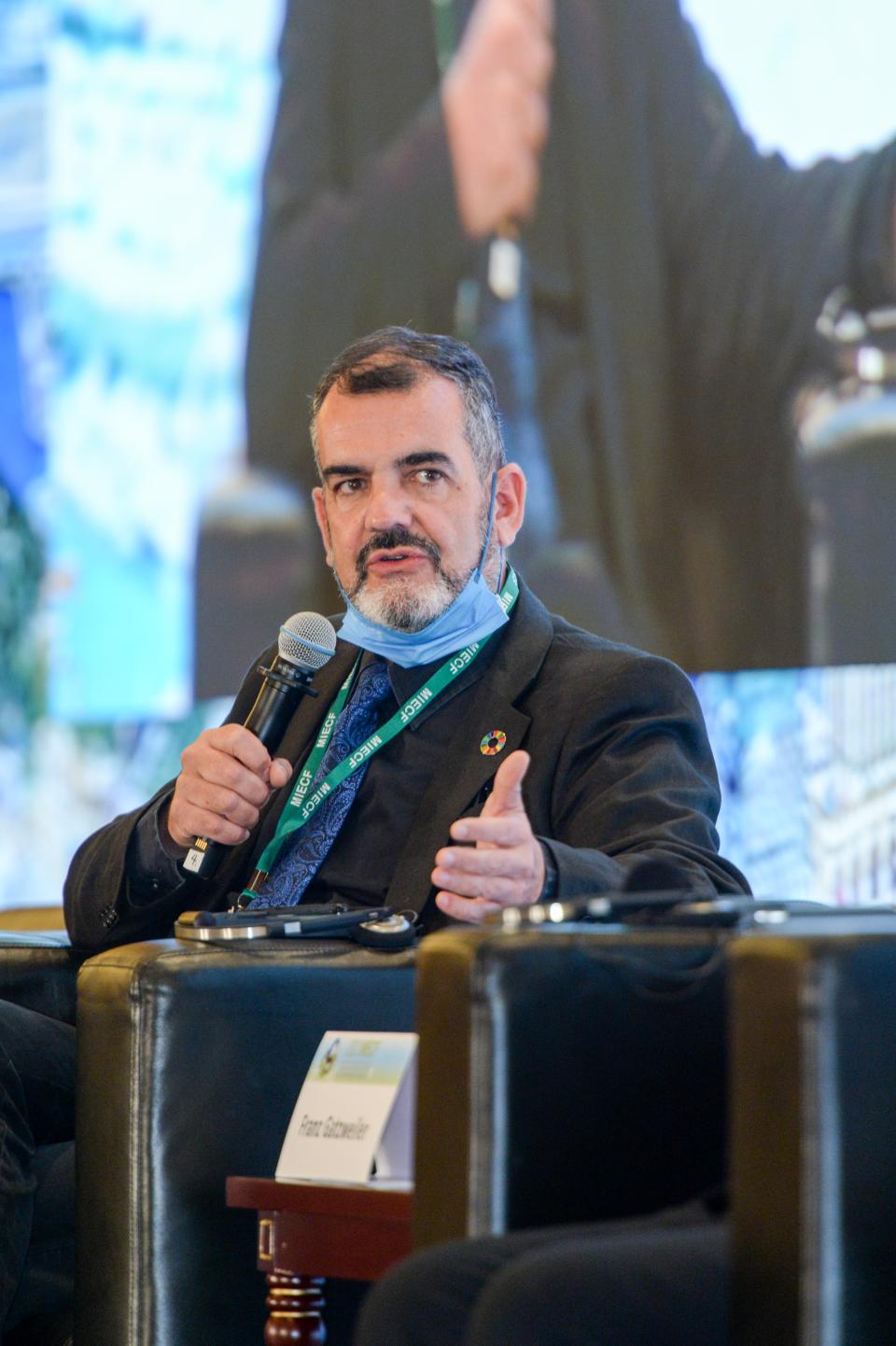“2022 Macao International Environmental Co-operation Forum & Exhibition” (2022MIECF) was held on December 9 - 11, 2022, co-organised by Macao Trade and Investment Promotion Institute (IPIM) and PricewaterhouseCoopers Macau (PwC Macau). Dr. Franz Gatzweiler, on behalf of UNU Macau, delivered a speech at the "Green Forum Session 1: Development of Sustainable Innovation Ecosystem with the Intergrowth of Green Industries" on the opening day, stating: "Society 5.0, Industry 4.0, Globalization 3.0 and (above all) Ecological Civilization are some visions of our common future which we should not lose sight of when discussing the transformation of civilizations." He called for support and collaborations in utilising collective intelligence for an ecological civilization.

Read the full speech as below:
Dear Ladies and Gentlemen. Dear organisers of the MIECF event.
I think it is important to understand the changing context in which we are transforming into a Green Economy, what it means to be human and the kind of society we are developing into.
Scientists tell us that humans have had a major and measurable impact on the biosphere, to an extent that we are crossing planetary boundaries and stressing the ecological life support functions - that threatens our own health, wealth, progress and survival.
At the same time we have never been better connected by digital technology and transport infrastructure.
To make a long story short, we are moving from living in a relatively empty world to a full world. We are on an unprecedented growth path that has brought incredible wealth. Aggregate global wealth rose to USD 464 trillion, and wealth per adult rose USD 87,489. Global wealth per adult is forecast to rise further 28% by 2026. -- I think we need to look carefully were that wealth comes from, make sure it does not undermine its own foundations and be prepared to redirect financial flows to what we value: the protection of the foundation of human wealth, which is nature.
The UN report “Our Common Agenda”, speaks of us being at an inflection point at which the choices we make today will lead to either breakdown or breakthrough. It is not the first time in history that we have come to such points, but it is the first time in history, that we can draw on a rich repository of data and knowledge and a digital infrastructure to create collective intelligence and act on the basis of our commonly shared values.
At that inflection point, further growth produces disutilities and the costs created by further growth of the same kind, overtake the benefits of growth. This is for example observable in cities today when urban lifestyles negatively impact human health and eliminate the urban advantage: Light, noise, air and water pollution, obesity, infectious diseases, mental health problems…. are just some examples. But those costs are currently still measured as progress. The sicker we get the more money can be made in the health system and all associated systems in the economy. We do not want that. Also not in the ETS, but many of the current incentive mechanisms make it difficult to change.
At the inflection point values change – societal values. Which, BTW underly economics, not prices. If the economy is not based on what people value, it will not last long.
At the inflection point, the value of a tree changes from being a commodity which can be bought and sold on the market - into an integral part of a life-supporting ecosystem providing a wide range of public goods and services.
At the inflection point, things turn around. When the value of nature changes (due to changing environments), the nature of economic value must change as well. If that is not understood and reflected in our social institutions, we have plenty of examples from history to show us how civilizations have collapsed.
What does that mean for Emission Trading Systems (ETS)? Well, the same logic needs to be applied. An ETS will not achieve its goals of reducing carbon emissions if it is just about creating a market for a new commodity, which is carbon. The same is true for ecosystems and biodiversity. Decades of research, for example the UNEP on “The Economics of Ecosystems and Biodiversity”, have taught us that.
For a long time, it seems, that prices had been too low for effectively reducing carbon from the atmosphere. That is because there was an oversupply of carbon credits but what that actually meant, economically, is that it did not reflect societal values. The core critique I pick up from the scientific literature here is that a market system alone is a too simple solution to a complex problem.
Unsustainable land use, climate change and biodiversity loss still receive a neglectable amount of green finance. At the Digital Forum on Sustainable Finance for Nature Based Solution in Luxemburg, March this year (2022), experts estimated that we need to triple our investments into nature. This hasn’t happened yet because, e.g., there are financial risks involved (like energy storage and weather for solar technology) and because pay-offs can usually only be expected in the long term. Policy frameworks and other changes need to provide incentives for investments in green projects and make it less attractive to invest in fossil fuel-based projects, which are still subsidized.
A sustainable solution needs to be a part of a more transformational, ‘holistic’ change of the economy and society. Everybody needs to be part of that and digital technologies can help.
But Emission Trading Systems, carbon and green finance require a vision and a more fundamental change in society. Society 5.0, Industry 4.0, Globalization 3.0 and (above all) Ecological Civilization are some visions of our common future which we should not lose sight of when discussing the transformation of civilizations.
Allow me to propose that the government of Macau and China support the diversification of the economy by investing into collective intelligence for an ecological civilization demonstration project to create visible evidence for innovation. At the United Nations University in Macau we work towards that transformational change and seek your collaboration --- Thank you for your attention.



